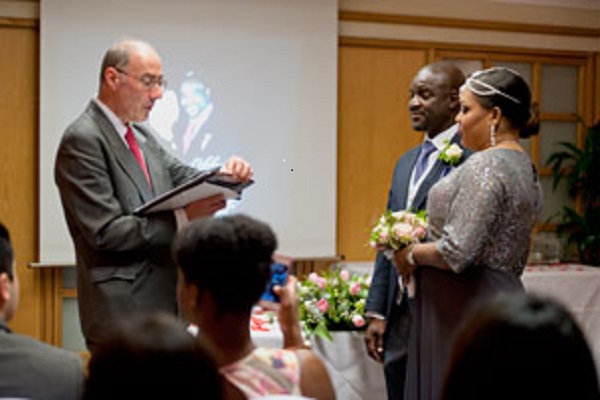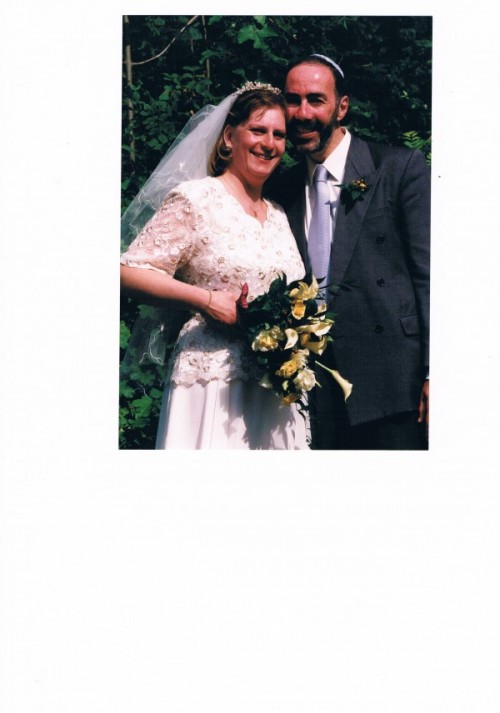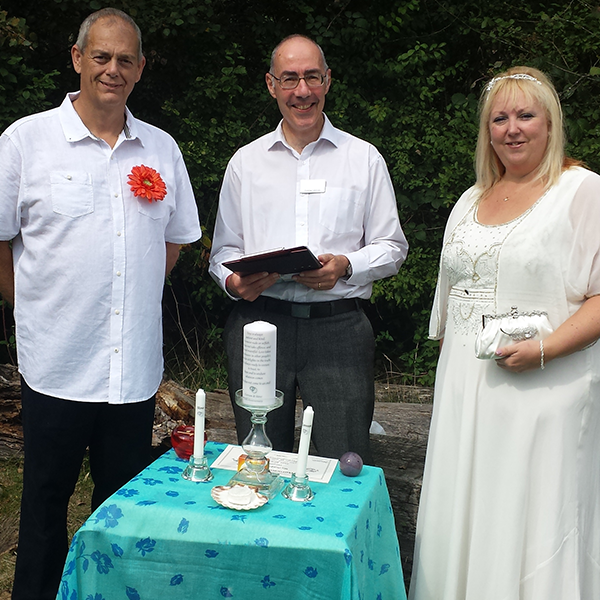by Michael | Jul 5, 2016 | Blog
It’s not unusual for couples to be entering a second marriage. As a celebrant, I delight in seeing more mature people so obviously in love and glowing with joy.
Being that bit older can often mean that the couple has freedom to choose how they want to mark their big occasion. They may be of independent means – and, of course, their parents may not have the influence on decisions that they once had – indeed, they may not even be around any more. So the couple can do it “their way”, and that’s brilliant!
However, a more challenging aspect may be how (or if) to involve any children that may be on the scene.
The children’s ages will be a deciding factor, as will personality, and personal choices.
If you want to involve them actively, I’d suggest any (or all) of the following – aimed primarily, but not exclusively, at teenage children:
- Involve them in the planning
Your children will probably appreciate being consulted and involved, particularly when it comes to the reception. They may have surprisingly good ideas about a children’s table, their menus, entertainment and music.
They might even emerge onto the dance floor at the reception, if a few of their favourite songs have been included.
- Involve them practically
More artistic children may be able to create décor either for the ceremony or for the reception (serviette folding, name cards, banners, etc.).
Musical ones – very musical children – may be able to sing or play something either at the ceremony or at the reception. (Just beware of being too self-indulgent : inviting little Johnny, who’s only had four hours’ lessons, to play Sibelius’s violin concerto is asking for a lot of restlessness among the guests [beyond the initial “aaah, bless”].)
Some may be able to read a text of some sort (although they may need instruction on reading in public).
Children may be part of the procession/recession, although again instruction from, say, the celebrant may be wise.
Do give each of the children a role, and, unless it is unavoidable, don’t leave anyone out.
- Invitations
If it fits in with your budget, maybe you can let your child invite a best friend. That way, they won’t feel isolated in an adult world, but can enjoy empathetic company.
- The Ceremony
Apart from processing, a child can be an usher (possibly, with a specific role, such as directing people to their places, or collecting and guarding the presents). A child can give away the mother, or can be the ring-bearer (but choose that child with care!).
Children can also be part of a ritual.
- Unity Rituals
Among possible rituals, one example is the Unity Candle ritual. Each child is provided with a taper and (health and safety permitting!) they all use these to light the Unity Candle together with the bride and groom. The symbolism is strong and affecting.
An alternative is for them to make vows to their new step-parents (who could reciprocate).
- Make the children feel special
Again, age will be a determinant, but an older child could propose a toast at the reception.
Dancing with the step-parents can be a lovely touch (but arrange this with both parties well in advance!).
Children can be a boon or a challenge at such an event. Make a positive out of their presence!
As the children (like it or not!) are joining a new family, it makes a lot of sense to include them wherever possible. If you start bonding with them in early days, that has got to make sense, hasn’t it?

by Michael | Sep 15, 2015 | Blog
There’s always talk about the high divorce rate, but that doesn’t seem to put people off from contemplating a second marriage. Whether their first marriage had broken down irrevocably or had ended through death, a new life begins with a second marriage.
The Whole ‘Shebang’
For your second marriage, there is nothing to stop you from organising a large-scale affair (assuming you have the funds and will to do so). But you may feel that you’ve ‘done it all before’ and would like a more modest ‘do’, and that’s absolutely fine.
Depending on your circumstances and also choices, a full religious service may not be a practical option, so remember that a civil celebrant will be able to create a wonderful and moving ceremony for you (and it can be as religious, or not, as you want it to be).
Likewise, the venue and reception can – and should – reflect your wishes, as well as your budget.
Little problems
Many remarriages will bring children from the first marriage in tow. This may seem a tricky complication, but, although the age of the children is a factor to be considered, there are ways to turn this to your advantage.
It’s absolutely fine if the children remain on the periphery or keep a low profile. Whatever you choose has to be right.
However, if kids can be involved (positively!), this can enhance the ceremony for all concerned (including the guests).
Possible Solutions: before the big day
Children can be invited to a play a part in the planning and at the event itself. Beforehand, they might be asked for a few choices of music (maybe for the service, but, more likely, for the reception). They might be able to help prepare the table decorations for the reception.
Possible Solutions: the big day
An obvious way to involve children is by employing them as bridesmaids or ushers. They can also take part in the ceremony, either by giving their mum away or even (if trusted sufficiently!) by keeping the rings until the ring blessing.
They can also take part in various rituals. There could be brief mutual vows between themselves and the new step-parents; they could participate in ceremonies like sand-blending or Unity candle-lighting, which beautifully symbolise the coming together of two families.
Possible Solutions: the reception
There are various ways that the children can be made to feel special. They can usher people through to the reception. Older ones might propose a toast at the meal or even, in certain circumstances, deliver a very short speech (but this is fraught with potential dangers, and needs to be entered into with eyes wide open!). I advise looking at my blog about groom’s speeches, which contains some important counsel about speech-making in general.
They could have their own table (and possibly, own menu) and entertainment (glo-sticks, fancy dress, magician etc.)
They might even be invited to dance with their new step-parents, although this should not be insisted upon too much!
It certainly makes sense at every level to include the children. You can get your new life off to a great start by keeping them sweet.
Whether or not there are children to consider, whether or not you have already had a big wedding the first time around, make no mistake: your second marriage is a significant step and deserves to be commemorated in the way that meets your beliefs and wishes.

by Michael | Mar 17, 2015 | Blog
Divorce is not necessarily the only cause of a marriage break-up. One other I could name is death. But whatever the reason for the break-up, it can be difficult to gee oneself up for a second wedding.
Certainly, many people who remarry choose to go for a smaller affair than the first.
One big ‘plus’
A huge advantage about a second wedding is that it can be fun!
There is no reason now why there should be the stress of family pressure. Your second marriage is exclusively about you. You are mature, consenting adults – maybe with your own children and homes. This ceremony is all about your commitment to each other (although sharing the celebrations with others is very much a part of it too).
The good news is, then, that you don’t have to follow other people’s rules. You can do what you want.
That means that clothing, guests, venue, celebrant, reception are all up to you.
Clothing
There is no obligation to wear – or avoid – any particular clothing. If a second-time bride wants to wear white, why shouldn’t she? (Even if she wore it the first time around.) A full-length gown is lovely, but why not a shorter dress in a different colour or colours? Formal or informal? It’s down to you.
Guests
It is almost unthinkable, but you can actually invite only the people you want. You can have a huge affair or fly off somewhere with just a couple of friends. You might have a small reception for closest family and friends. There is no need to break the bank, if you do not want to.

Ceremony
If you want a creative, personalised ceremony, then have a chat to a Civil Celebrant. You will get good ideas and will be able to put together a ceremony that reflects your personality and will be really special.
There’s plenty of information at https://vowsthatwow.co.uk/civil-weddings/.
Venue
Depending on your religion’s take on remarriage, the religious option may be for you; you may want only a quiet (if uninspiring) register office wedding.
Many people these days choose a hotel or restaurant, but there’s nothing to stop you using a back garden, museum, hot-air balloon or wherever your imagination takes you. (Do get permission first!)
It can be a casual affair or as formal as you choose. But remember: whatever you go for, the wedding will need to be legally recognised, of course.
Reception
Again, the scale and budget of the affair will dictate what sort of reception you will choose. You might like to read my comments on receptions in a recent blog:http://wp.me/p5qOOT-w7 .
Wedding gifts
You can come up with a wedding list, but you may – especially if you are combining two homes – already have virtually everything you need. You can, however, invite guests to contribute money to a charity of your choice.
I hope these suggestions will be useful to you – whichever number marriage you are embarking on! You will learn from any past mistakes and enjoy precisely the wedding that you want. Good luck with it!
by Michael | Nov 18, 2014 | Blog
It’s certainly not uncommon for couples to embark on their second marriage. A potential complication can arise when either, or both of them, has children.
How should these be involved in the ceremony?
Of course, this is a matter of choice. They may prefer to stay on the periphery – or you may decide that they should keep a low profile. A lot will depend on the age of the children.
Here are some suggestions that might work well, particularly with teenage children.
- Planning
Your children could contribute towards the choice of music at the reception. You might be surprised at what they actually ask for – and it will be special if they are out on the dance floor (voluntarily) from time to time.
If they are artistic, children may be able to help create the ceremony décor; very musical ones might be able to sing a bit at the service, accompany the music on guitar etc. (if up to it!) or simply do a reading.
Children might be allowed input into the choice of menu at the reception – especially if they are getting a different meal.
Do give each of the children a role, and, unless it is unavoidable, don’t leave anyone out.
- Invitations
If you can afford it, why not let your friend/daughter invite a friend (each)? Even the moodiest of teenager will appreciate the gesture, and your kind thought may spare him/her from what can be a fairly isolating experience.
- The Ceremony
There are plenty of ways to involve the children in the ceremony itself. Traditionally, they can be asked to be ushers (groomsmen) or bridesmaids. But younger boys could do the Best Man bit with the rings (although I understand it, if that is considered by some a risky move!). They could be the ones who give Mum away at the start of proceedings.
- Unity Rituals
A lovely idea is to ask the children to participate in a ceremony ritual. They could make vows to their new step-parents (who could reciprocate). They could be part of a sand-blending ceremony, but my favourite is the Unity Candle.
Provide each child with a taper and (health and safety permitting!); they and the couple all use the tapers to light the Unity Candle at the same time. The symbolism is strong and affecting.
- Make the children feel special
After the ceremony, children could help usher guests through to the reception. Then, with age of course a determinant, an older child could propose a toast at the reception.
They might be given flowers to present to their mothers or new step-mothers at the time of the speeches.
Depending on the child’s maturity, he/she could be allowed a very short speech.
Dancing with the step-parents can be lovely (although it may be as well to warn the step-child well in advance!).
As the children (like it or not!) are joining a new family, it makes a lot of sense to include them wherever possible on and maybe before the big day. If you can start bonding with them in early days, that has got to be for the best.
Michael Gordon can help prepare and conduct a tailor-made civil ceremony in or around London, or, indeed, in Europe.



